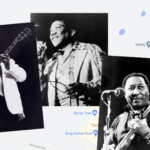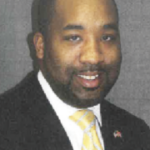

At a press conference Monday, the importance of collaboration between Black farmers and incorporation of their farms was emphasized as a means to unlock economic opportunities for the minority community as Blue Oval City makes its home in the region.
The meeting, organized by the Black Farmers and Agriculturalists Association, aimed to address challenges faced by Black landowners and empower them to embrace a paradigm shift for economic prosperity.
Dr. David Allen Hall, Chief Bishop of the renowned Church of God in Christ, acknowledged the historical challenges faced by African Americans in maintaining ownership of their lands but urged attendees to focus on the opportunities presented by the arrival of billion-dollar corporations in the state, such as Ford Motor Company, General Motors, and Volkswagen.
“We’re here to support (Blue Oval City),” said BFAA President Thomas Burrell. “This is a boom. This is a once in a lifetime opportunity that we are blessed to have in literally our backyard.”
As he passed out maps, Burrell said he noticed the Great Migration took Black people out of the South but Blue Oval City might bring them back.
“Notice there’s a trend going on – 50, 60 years ago we would leave the South, going to Detroit, going to Indianapolis, going to Flint, Michigan, going to Saginaw, Michigan … To do what? To work for the automobile industry. But now the automobile industry is doing what? They’re coming to us.”
The community leaders emphasized the need for a paradigm shift in their approach to land ownership and development to capitalize on the booming automobile industry in the region.
“Most of the land that’s owned in this general area is owned by the minority community, but you notice we are not a part of the map, are we? Now, we can say that was racially motivated, but let me tell you what we’re going to talk about earlier. Most of the land that we own now, we own as heirs, meaning we don’t have a clear deed of what title to our property and that’s not just a problem here.
“In Tennessee, African Americans had acquired in 1910, when Henry Ford was starting with that Model T, we owned already 16 million acres of land. Today, we own less than about five million because we have lost it. Be that as it may, what we’re simply saying, though, it is time for us to think outside of what? The box. It’s time for us to look at what we have a little differently. It is time for us to do, and you hear the phrase a lot, to do what? A paradigm shift.”
Burrell highlighted the importance of collaboration and pooling resources to take advantage of the $5.6 billion investment by Blue Oval City, which could potentially create thousands of new millionaires within the minority community.
“Now, we know we have some issues, but … like Dr. Booker T. Washington said in 1865, ‘Now, we ought not to allow our grievances to overshadow our opportunities,’” said Burrell. “Do we have grievances? Yeah, we’ve got lots of them, haven’t we? But do we also have opportunities?”
Challenges such as eminent domain were addressed, with community leaders highlighting the positive aspects of developments like the extension of Tennessee Highway 194 into the Mason area. They emphasized that the remaining land could be developed into hotels, restaurants, service stations, housing projects, apartments, and warehouses.
The importance of incorporation and collaboration was further emphasized in subsequent meetings. African American landowners were encouraged to come together and explore opportunities for growth and prosperity. They were advised to consider incorporating their land to attract major corporations and ensure the fair distribution of shares across generations.
Speakers highlighted the success stories of incorporated farms and the benefits of pooling resources. They stressed the need for a direct line of communication with corporations and government agencies and provided guidance on the incorporation process.
“If we as black landowners, incorporate our land, then we position ourselves to where we can collaborate. We can collaborate as corporations working together,” said Terrance Cannon. “There was a group of Caucasian farmers that came together and collaborated. Joe said, ‘I’m going to kick in 500 acres.’ Billy over here said, ‘I’m going to kick in 1,000.’ You move from 1,000 acres to 2,000 acres to 3,000 acres … 3,000 acres. Now you got a 4,000-acre plot through collaboration. Mayor Franklin Smith, I think at the time, was helping to spearhead this. They took that land that those farmers had collaborated and put together through that map that you see. Then they went to Nashville and they got with the governor. The governor said, ‘Okay, we’ll purchase that land, 10,000 per acre or something of that nature, and then we’re going to market it as a megasite.’ And they got rich. They became instant millionaires because they collaborated. We’ve got to have a paradigm shift, change our mindset, start collaborating as African American landowners and gain the wealth.”
Attendees were urged to think outside the box, explore alternative agricultural options, and be prepared for upcoming developments.
The meeting showcased the commitment of community leaders in advocating for collaboration and incorporation. They emphasized the need for unity and a strong advocate to represent the interests of the community.
Attendees were inspired to take action, recognize the potential impact of their collective efforts on future generations.
Moving forward, the community plans to continue their collaborative efforts, attend public meetings, and engage in advocacy to ensure their voices are heard. The journey towards economic prosperity and generational wealth has begun, with the potential to serve as a model for other communities across the country.
They hope to also provide generational wealth for their families.
Said Burrell: “This is the beginning. You want our grandchildren to remember June the 26th of 2023. That was the date that we started talking about this matter.”






Leave a Reply